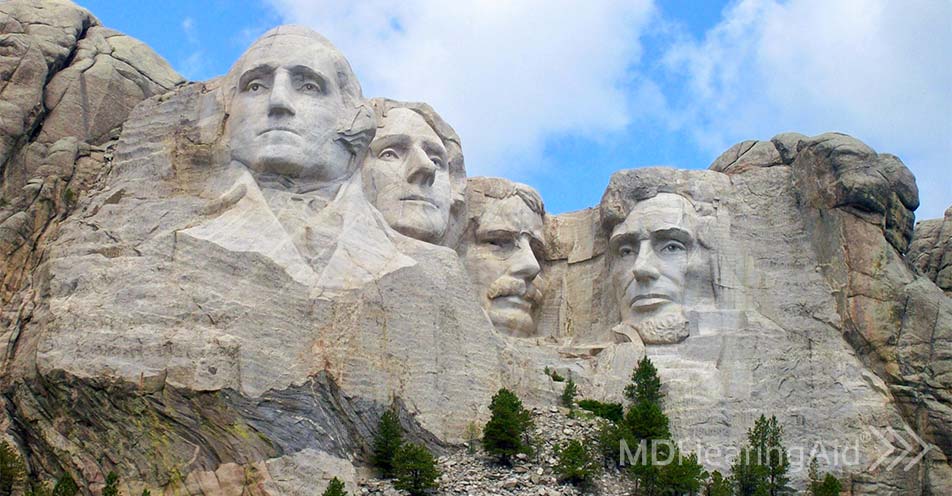Hearing loss can happen to anybody, even presidents of the United States. Yet many people who have hearing loss put off getting hearing aids because they’re embarrassed to wear them. Despite the stigma, some presidents with hearing loss have worn their devices publicly, setting a great example for their constituents.
Here’s a look at seven U.S. presidents known to have experienced hearing issues, listed chronologically.
George Washington
One of the first things American school kids learn about George Washington is that he had at least one set of wooden teeth. But besides dental issues—and a variety of other health scares, including smallpox, tumors, influenza, and pneumonia—Washington also had hearing issues. During his presidency, a bout of influenza and pneumonia nearly killed him, leaving him with hearing loss in the last years of his life.
Thomas Jefferson
Thomas Jefferson, the third president of the U.S., suffered from an assortment of ailments throughout his life, most notably headaches that he seemed to get during stressful times—including just before writing the Declaration of Independence. In his mid-70s, he wrote about problems hearing when multiple people spoke at the same time: “My hearing is distinct in particular conversation, but confused when several voices cross each other, which unfits me for the society of the table.” By 1825, the year before his death, his hearing loss had become so severe that he felt like a “stranger” in the world.
Ulysses Grant
The 18th U.S. president, Ulysses S. Grant, was the general for the Union Army in the Civil War before ascending to the presidency. However, his ailment wasn’t hearing loss due to battle noise or injuries, but rather that he was tone deaf. Possibly a neuro-cognitive disorder more than a hearing impairment, Grant was unable to hum or distinguish one piece of music from another—a condition later termed “congenital amusia.” In fact, the only song he could identify was “Yankee Doodle Dandy.”
Theodore Roosevelt
Although known for the famous saying, “speak softly and carry a big stick,” 26th president Theodore Roosevelt didn’t shy away from a fight. He particularly loved boxing and continued to spar as a hobby even after he occupied the White House. One match left him nearly blind in his left eye, unbeknownst to his friends or most Americans. Thirteen years later, in 1918, Roosevelt lost the hearing in his left ear after surgery to remove abscesses from a thigh and both ears.
Herbert Hoover
The 31st president, Herbert Hoover, began wearing a hearing aid well after his presidency ended in 1933, when he was in his 80s. The New York Times attributed his hearing loss to “flights in unpressurized airplanes” earlier in his life. Perhaps of more interest, his son, Herbert Hoover, Jr., experienced hearing impairment after a severe bout of the flu when he was 15. The teenager was interested in radio and electronics from a young age, and therefore developed a hearing aid for himself.
Ronald Reagan
Ronald Reagan, who served eight years as the country’s 40th president when he was in his 70s, started wearing an in-the-canal (ITC) hearing aid while he still occupied the White House. Custom-made for him, he relied on the device to help with problems hearing high-pitched sounds with his right ear. A doctor had begun treating Reagan for hearing issues four years earlier, before he even took office. That doctor attributed the hearing loss to an old injury from Reagan’s acting days, when a pistol was fired near his ear during filming for a movie. Reagan wore the hearing aid publicly, during the regular activities of his presidency.
Bill Clinton
Like Reagan, Bill Clinton was prescribed hearing aids while still serving as president. Unlike Reagan, the 42nd president was only 51 at the time, and he needed them for both ears. Clinton’s hearing loss was likely due to his participation in a band in his younger years, which resulted in a loss of the higher sound frequencies. His doctor at the time deemed the hearing loss “moderately-severe,” but nothing that his ITC hearing devices couldn’t help make better. Clinton wore them and carried on with his regular duties, including meetings and state dinners that involved large groups and noisy conversations.
Modern Hearing Aids
This list of seven presidents with hearing loss is just a small percentage of the country’s total number of presidents. However, it is important for those with a hearing impairment to recognize that even the most powerful person in the country may need assistance to hear. Everyone should have their hearing checked periodically and get the hearing aids they need to improve their quality of life.
Hearing aids have come a long way in the decades since Herbert Hoover, Jr. created his own, and technological advances continue to make them more powerful, more accurate, more discreet, and more comfortable.
Want to learn more about modern, affordable hearing aids?
DISCOVER HEARING AIDS


